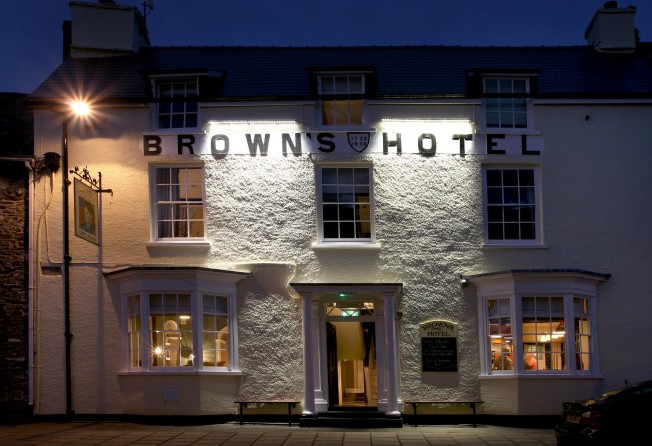
Hot spots: Browns Hotel, Laugharne
Kevin Pilley

What is it? Browns (without the apostrophe) Hotel has changed a lot since poet Dylan Thomas used to "moulder" in the corner of the bar, scribbling on the back of Woodbine cigarette packets and cadging anything he could (mainly money and pints of the local Felinfoel beer; the Welsh national treasure had clocked up a bar tab of £550 by the time of his death, in 1953). Built in 1752 as a private house, Browns is in Laugharne, Carmarthenshire, in southwest Wales, an hour from Swansea, where Thomas was born and lived for 23 years.
What would Thomas have thought of Browns now? Not a lot, probably. It's recently been revamped and reincarnated as a boutique hotel, whereas he liked it bohemian - more spit and sawdust; less trendy traditional. A sign bearing a portrait of the famous dissolute hangs outside. When the wind blows, he shakes his head and seems a little confused by the makeover, which has turned his beloved boozer into a business rendezvous offering "a complete conferencing experience" - just in time for the centenary of his birth next year.
What, specifically, might he disapprove of? Maybe the Wi-fi, digital radio with iPod docking station and LCD HD television in each of the 14 rooms. The "organic natural mattresses and crisp white linen adorning lovingly made beds" would have him turning in his grave, down the road in St Martin's Church. The place has even had to become, by law, a non-smoking zone; the sign outside shudders. What the man of words would have made of the ambient house music, thick XL wool "Cymru" cushions and throws, organic Welsh clay paint, en-suite mao feng green tea and peppermint tummy tonic, "authentic cupboards", marble-tiled showers and Dennis Wheatley books in the rooms is anyone's guess. He may have questioned where minimalist becomes under-furnished and whether cosy is a euphemism for small. He wouldn't have recognised the toilets; he used to use the drain outside.

In the front room you hear him reading his poems on a period wireless. You can eat on the terrace listening to "the palaver of birds". Cawl (beef and vegetable broth) and Welsh teacakes are served. Browns has no restaurant, though - you eat next door at The New Three Mariners (breakfasts are good but dinners disappointing - the cockle and laverbread [seaweed] pizza's main ingredients are beyond microscopic).
Thomas would also have smiled at the laughter in the bar he made famous. And despite the peeling paintwork, scaffolding and dereliction he would see that the town of Laugharne - his "magical bedlam by the sea" - remains largely how he remembered it: "Beautiful. Barmy. One of the strangest towns in Wales." And certainly one of the friendliest.
What's the bottom line? Rooms start at £95 for a "cosy single" and rise to £135 for a suite. Those prices include a full Welsh breakfast. For more information and bookings, go to www.browns-hotel.co.uk.